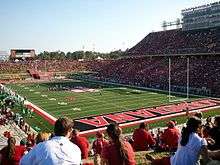Cajun Field
| "The Swamp" | |
|
| |
| Location | 201 Reinhardt Dr, Lafayette, Louisiana 70506 |
|---|---|
| Coordinates | 30°12′57″N 92°2′31″W / 30.21583°N 92.04194°WCoordinates: 30°12′57″N 92°2′31″W / 30.21583°N 92.04194°W |
| Owner | University of Louisiana at Lafayette |
| Operator | Univ. of Louisiana at Lafayette |
| Capacity |
36,900 (2014-Present) 31,000 (1992-2014) 26,000 (1971-1992) additional capacity on hill behind north end zone(1971-Present) and the South End Zone (1971-2014) |
| Surface | ProGrass, Artificial turf |
| Construction | |
| Broke ground | 1970 |
| Opened | September 25, 1971 |
| Renovated | 1992, 2008, 2014 |
| Tenants | |
|
Louisiana–Lafayette Ragin' Cajuns (NCAA) (1971–present) New Orleans Bowl (NCAA) (2005) New Orleans Breakers (USFL) (1 game, 1984) | |
Cajun Field is a football stadium located in the city of Lafayette, Louisiana. Nicknamed The Swamp, it is the home field of the Louisiana–Lafayette Ragin' Cajuns. Cajun Field is primarily used for its American football and women's soccer athletic teams.
Cajun Field has 2,577 chairback seats and bleacher seating to the capacity of another 33,323, giving the stadium an official seating capacity of 36,900. In planning since at least 1967 (when a rendition was featured on the football media guide), it was built in 1970 as a replacement for McNaspy Stadium, opening on September 25, 1971 with a shutout of Santa Clara University. The stadium consists of a bowl with seating on the sidelines, with a second deck on the west sideline. In one of the biggest games at the stadium, on September 14, 1996, 38,783 spectators saw the Cajuns upset 25th-ranked Texas A&M, 29–22, the first victory for the Cajuns over a ranked opponent.[1] The largest crowd at The Swamp as of 2013 was 41,357 fans on September 5, 2009, when the Cajuns beat Southern University 42–19 at the 9th annual Herbert Heymann Football Classic.[2]
The stadium won the Sun Belt Conference Attendance Championship in 2004, 2008, and 2011.
Because of Hurricane Katrina, the 2005 New Orleans Bowl was played here instead of in New Orleans, with Southern Miss defeating Arkansas State, 31–19. Also the Tulane Green Wave football team used it for a home game in 2005 after being displaced by the hurricane.
In addition, Cajun Field hosted the final pre-season game of the New Orleans Breakers of the United States Football League on February 18, 1984, a 20–0 victory over the Memphis Showboats.
Facility upgrades
Updated Seating
In 1992, Cajun Field saw the attendance rise from 26,000 to 31,000 due to an upgrade to the ends of the stadium seating.
Synthetic surface and banners
In the summer of 2008 Cajun Field replaced its long-standing natural grass with ProGrass, an artificial turf. The stadium was pressure-washed and repainted. Advertisements and banners reading "University of Louisiana at Lafayette," "Ragin' Cajuns," and "www.ragincajuns.com" also were installed around the black retaining wall that surrounds the field.
Athletics Master Plan
In spring 2014, construction of the south endzone seating began. This first phase project included bowling in the south endzone with new bleacher seating as well as concession and restroom facilities. This change has increased capacity to 36,900 and was completed for the 2014 season kickoff.[3] Daktronics will also be installing a 30 foot by 54 foot HD screen in the north endzone, replacing the previous scoreboard [4]
"The Swamp"

Cajun Field's surface is two feet below sea level in a natural bowl. With the below-sea level playing surface, a total of four 60 horsepower (45 kW) pumps and a sophisticated drainage system help keep the field in good playing condition even during the frequent south Louisiana rainstorms. The subsurface stadium requires many fans to walk down to their seats. Ragin' Cajuns football players and their opponents enter Cajun Field through an underground tunnel from the Louisiana-Lafayette athletics complex.
In 1988 the stadium was nicknamed "The Swamp," as then noted on stadium signage, in the school yearbook and, a year later, in the 1989 official Southwestern Louisiana sports media guide. The nickname is tied to the field's early 1970s construction, and even refers to the original football field for what was then the Southwestern Louisiana Industrial Institute in the early 1900s. The university's first football field was on the main campus adjacent to a small cypress pond, which later became Cypress Lake, also nicknamed The Swamp.
The Swamp nickname also fits with the area's geography, with many bayous and wetlands, including the Atchafalaya Basin and the nearby Gulf of Mexico marshlands. The National Wetlands Research Center, a United States Geological Survey research facility at the University of Louisiana at Lafayette, is less than a half-mile from Cajun Field.
Division I FBS Ben Hill Griffin Stadium at the University of Florida was later also nicknamed "The Swamp" by then-Gators head coach Steve Spurrier in 1991.
Top 20 Crowds at Cajun Field
- 41,357 vs. Southern Jaguars (09/05/09)
- 38,783 vs. Texas A&M Aggies (09/14/96)
- 36,170 vs. Southern Jaguars (08/30/14)
- 36,133 vs. Alabama Crimson Tide (10/06/90)
- 33,828 vs. McNeese State Cowboys (09/15/07)
- 32,823 vs. North Texas Mean Green (10/15/11)
- 30,176 vs. Arkansas State Indians (now Red Wolves) (11/06/76)
- 30,028 vs. New Mexico State Aggies (11/02/13)
- 29,775 vs. Troy Trojans (10/08/11)
- 29,758 vs. Tulane Green Wave (10/06/12)
- 29,031 vs. FIU Golden Panthers (11/01/08)
- 28,871 vs. Nicholls State Colonels (09/14/13)
- 28,752 vs. Northwestern State Demons (11/12/77)
- 28,741 vs. Nicholls State Colonels (09/17/11)
- 28,176 vs. Louisiana-Monroe Warhawks (11/05/11)
- 27,814 vs. San Jose State Spartans (10/30/93)
- 27,300 vs. Northern Illinois Huskies (10/15/88)
- 26,891 vs. McNeese State Cowboys (09/10/16)
- 26,824 vs. Northwestern State Demons (09/12/15)
- 26,640 vs. Louisiana Tech Bulldogs (10/02/76)
See also
References
- ↑ 2006 Ragin' Cajuns Football Media Guide, p. 111.
- ↑ "Bayou Bash at The Swamp". Retrieved September 6, 2009.
- ↑ http://ragincajuns.com/custompages/MediaGuidepdfs/Football/2014/2014_FootballGuide_Final.pdf
- ↑ http://www.daktronics.com/news/Pages/University-of-Louisiana-Partners-with-Daktronics-for-Video-Display.aspx